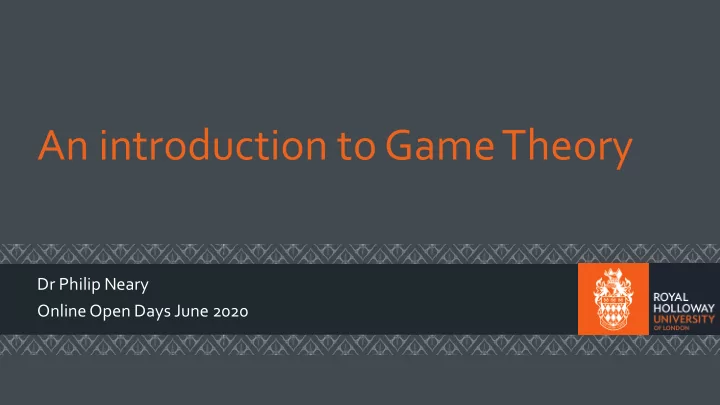

An introduction to GameTheory Dr Philip Neary Online Open Days June 2020
Roadmap 1 What is Game Theory and why is it so prevalent in economics? 2 Examples of where it appears in economics. 3 Everyone is already a game theorist. . . 4 Assumptions of Game Theory + video.
What is game theory? • Game Theory was developed to analyse “optimal” play in board games like Chess, Checkers, Go, etc. • In board games, players want to “win”. This fits well with the economic notion that individuals are ‘rational’. • In order to win, you have to ‘strategise’. “Brian really knows how to game the system”
• A less catchy, but more accurate and descriptive name, is “Interactive Strategic Decision Making”. • A key feature shared by many real world situations is that the optimal decision for an individual depends on what other people do. • Example: Thomas Schelling on “where to sit in a lecture theatre”
Where is game theory used in Economics? Game Theory appears everywhere in economics! • Bargaining salary negotiation mergers and acquisitions • Institutional design voting systems tax systems auction design • etc.
Example: An auction Suppose I want to sell an object via auction. There are 3 bidders • Person A bids £5 • Person B bids £4 • Person C bids £3 There are two natural questions for auction designer (the rules) 1. Who gets the object? (i.e., who ‘wins’?) 2. How much do the participants pay? 1st price auction? 2nd price auction? All-pay auction? There is one natural question for bidders (the strategy) 1. How much should I bid?
Game Theory versus “Classical Economics” • Classical Economics 1. Your decision and the fixed environment determine outcome. 2. Your decision does not impact the environment. • Useful, but hardly all-encompassing. Often... 1. Environment is not fixed and depends on the decisions of others. 2. Your decision can • directly change the environment, and • have knock on effects because others respond to it.
What is a “Game”? • A game has 3 components: 1. The players 2. The actions available to each player 3. The preferences of each player over outcomes • How does a game get played? 1. Each player makes a decision, i.e., chooses an action 2. These decisions generate an outcome 3. Each player has some happiness/payoff at the resulting outcome
Example of a Game Let’s consider the game Rock-Paper-Scissors 1. The players: Two players called Rowena and Colin 2. The actions available to each player: {R, P, S} 3. Preferences over outcomes: next slide
Example of a Game
What did we just do? • We considered an ‘economic’ environment, in this case a purely competitive situation, and wrote down a mathematical model that represents it. • But we would like to do more. In particular: • Can we ‘predict’ what outcomes will happen? • If yes, then Are these predicted outcomes ‘good’ ? Are these predicted outcomes ‘fair’ ? and so on
Nash Equilibrium • The most famous prediction tool is the Nash equilibrium: A pattern of behaviour, whereby everybody is doing as well as they can, given what everybody else is doing (see the 2001 Hollywood film “A Beautiful Mind”) • Note: while a Nash equilibrium is a “stable pattern” of behavior, it is not necessarily good or optimal I am bad at Microsoft Word, but my coauthors use it so I have to. I learned to drive on the left so feel more comfortable doing that but when I lived in America I drove on the right. QWERTY keyboard layout is inefficient. Why do we use it?
Assumptions of Game Theory • Assume that players are “rational”. Players know the rules of the game. Players can gauge how they feel about the different possible outcomes. Players act so as to maximise happiness - they are purposeful Players have belief about their opponents - they are empathetic • In fact, assume “common knowledge” of rationality. Everyone is rational. Everyone knows that everyone is rational. Everyone knows that everyone knows that everyone is rational. Everyone knows that . . . everyone knows that everyone is rational.
Common Knowledge in TV show Friends
Assumptions of Game Theory While common knowledge of rationality sounds extreme, there are situations where differing levels of knowledge can have profound consequences. Examples: • Whatsapp: blue ticks vs black ticks? • Poker: Suppose I know what cards you have. If I know what cards you have but you don’t know that I know, then I am at a serious advantage If I know what cards you have but you do know that I know, then I am still at an advantage but less of an advantage • Political messages: why are they so repetitive? • Half time Superbowl Ad: why so expensive?
Conclusion We talked about • What is game theory and why is it important • How game theory differs to classical economics • How game theory can be used to model real world phenomena Rock-Paper-Scissors (can be extended to chess, poker, etc.) • Common knowledge of rationality - to be strategic you have to empathise.
The end, thank you for watching
Recommend
More recommend